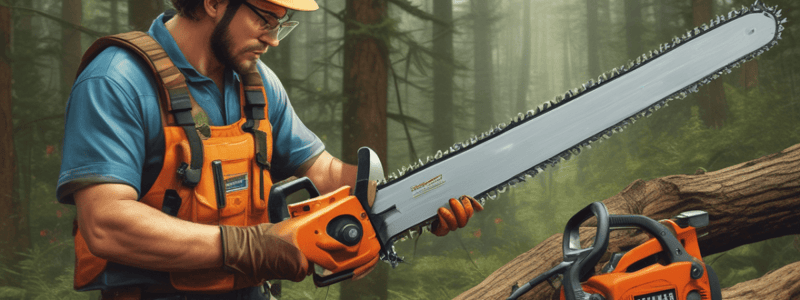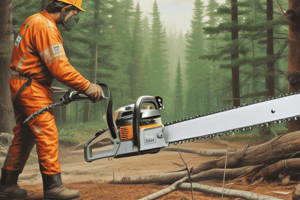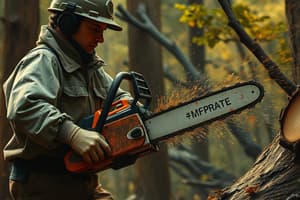Podcast
Questions and Answers
What should you do while the saw is warming up?
What should you do while the saw is warming up?
- Let the saw idle on a hard surface without monitoring it
- Shut off the saw immediately
- Hold the saw in one hand and rev it up to full RPM
- Properly hold the saw in both hands during the warm up period (correct)
How do you check the chain and bar oiling?
How do you check the chain and bar oiling?
- By smelling the chain and bar
- By revving the saw's RPM up and pointing the tip of the bar to a light-colored surface (correct)
- By checking the oil level in the tank
- By feeling the chain and bar for oil
What should you do to engage the chain brake?
What should you do to engage the chain brake?
- Pull the hand-guard towards the nose of the bar
- Flip the master control lever up
- Push the black hand-guard on top of the saw towards the nose of the bar (correct)
- Shut off the saw
What is the correct way to adjust the chain tension?
What is the correct way to adjust the chain tension?
Why should you check the chain tension regularly?
Why should you check the chain tension regularly?
When should the chain brake be engaged?
When should the chain brake be engaged?
What is the correct direction to turn the adjustment screw while tightening the chain?
What is the correct direction to turn the adjustment screw while tightening the chain?
What should you check after adjusting the chain tension?
What should you check after adjusting the chain tension?
What is the likely cause of a saw that won't start and has fuel/liquid coming out of the muffler?
What is the likely cause of a saw that won't start and has fuel/liquid coming out of the muffler?
How should the carbide teeth on top of the bar be positioned when reinstalling the chain?
How should the carbide teeth on top of the bar be positioned when reinstalling the chain?
What is the purpose of lifting up on the bar tip while tightening the chain?
What is the purpose of lifting up on the bar tip while tightening the chain?
In what position should the saw be in when attempting to start a flooded saw?
In what position should the saw be in when attempting to start a flooded saw?
What should you do if the saw won't start after 30-40 pulls?
What should you do if the saw won't start after 30-40 pulls?
What should you do to the throttle during the starting process?
What should you do to the throttle during the starting process?
What is the purpose of running the saw between idle and wide open for a minute or two?
What is the purpose of running the saw between idle and wide open for a minute or two?
What should you check on the spark plug?
What should you check on the spark plug?
What is the purpose of the Sawyer Kit?
What is the purpose of the Sawyer Kit?
What should you do to the muffler during the starting process?
What should you do to the muffler during the starting process?
What percentage of a blade remaining warrants a replacement?
What percentage of a blade remaining warrants a replacement?
What type of cutting wheel is suitable for cutting railway tracks?
What type of cutting wheel is suitable for cutting railway tracks?
What does the letter 'A' indicate on a diamond cutting wheel?
What does the letter 'A' indicate on a diamond cutting wheel?
How should the tensioning nut be positioned before tightening the V-belt?
How should the tensioning nut be positioned before tightening the V-belt?
When should the carbide tips on a blade be inspected?
When should the carbide tips on a blade be inspected?
What is the purpose of removing the screws from the filter cover?
What is the purpose of removing the screws from the filter cover?
What is the correct grip when operating the saw?
What is the correct grip when operating the saw?
What should you do when starting a cut?
What should you do when starting a cut?
Why should you always cut with the blade fully vertical?
Why should you always cut with the blade fully vertical?
What is the purpose of the daily visual inspection?
What is the purpose of the daily visual inspection?
How should you hold the saw when starting it?
How should you hold the saw when starting it?
What should you do after the engine turns over?
What should you do after the engine turns over?
Study Notes
Pre-Operation Checklist
- The operator should let the saw idle on a pad or soft ground while monitoring it, or properly hold the saw in both hands during the warm-up period.
- The saw should be properly held and slowly revved up to full RPM two to three times.
- The proper operation of the chain brake should be checked.
- The chain and bar should be checked for proper oiling by revving the saw's RPM up and pointing the tip of the bar approximately 4 to 6” from a light-colored surface.
Chain Brake
- The chain brake should be engaged by pushing the black hand-guard on top of the saw towards the nose of the bar.
- The hand-guard should be pulled towards the hand-grip to release the chain brake.
- The chain brake should always be engaged when the saw is stored.
Adjusting Chain Tension
- The chain tension should be checked regularly.
- The tension-adjusting screw should be turned clockwise to increase the chain tension.
- The chain tension should be adjusted to be as tight as possible without causing binding.
- The chain should be checked and adjusted regularly, especially after the chain has stretched or worn in operation.
Replacing a Chain
- The bar retaining nuts should be loosened with an appropriate tool, and then the bar adjusting screw should be backed off enough to remove the chain from the bar.
- The chain should be removed, and the carbide teeth on top of the bar should point towards the bar tip.
- The bar adjusting pin should be checked to ensure it is engaging the bar properly before installing the side cover.
- The side cover and nuts should be installed and hand-tightened.
- The adjusting screw should be turned clockwise to take up slack in the chain, while lifting up on the bar tip with the other hand.
Flooded Saw Procedure
- If the saw won't start after attempting the normal start procedures and/or has obvious fuel/liquid coming out of the muffler, it is most likely flooded.
- To start a flooded saw, the saw should be set to the "run" position, and two people should work together to pull the starter rope and hold the saw throttle in the "full on/wide open" position.
- The starter rope should be pulled repeatedly until the saw fires, and then the throttle should be held open until the saw runs well.
Minor Maintenance
- The carburetor box cover should be removed, and the air filter should be checked.
- The spark plug boot should be checked for damage, fraying, or dry rot.
- The spark plug should be checked and adjusted if necessary.
Sawyer Kit
- The Sawyer Kit should be maintained to ensure proper protective equipment is available to personnel operating chainsaws.
- The Sawyer Kit should include spare chains and tools.
- Always use the correct blade for the material being cut.
- Always operate the saw with one hand firmly placed around the front handle, and the other hand firmly holding the throttle assembly handle.
Cut-off Saw Anatomy
- The throttle safety and throttle trigger should be depressed simultaneously.
- The slide control should be moved to START.
- The choke should be set according to engine temperature.
- The primer bulb should be pressed 7-10 times.
- The starter should be pulled until it engages, and then given a brisk strong pull.
Daily Visual Inspection
- Daily visual checks should be performed at the start of each working shift to ensure cut-off saws are in good condition and ready for use.
- Fuel levels should be checked, and the saw should be fueled to 3/4.
- Cutting wheels should be inspected for wear, and replaced if necessary.
Cutting Wheels
- Composite Abrasive Wheels are suitable for cutting asphalt, concrete, stone, ductile cast pipes, and steel.
- Diamond Abrasive Wheels are suitable for cutting asphalt, concrete, stone, bricks, pipes, iron, and steel up to 10mm thick.
- Short names appear on the sides of the wheel, indicating the use of the wheel and the performance class of the diamond cutting wheel.
Studying That Suits You
Use AI to generate personalized quizzes and flashcards to suit your learning preferences.
Related Documents
Description
Learn how to properly start and operate a chain saw, including warming up the saw, checking the chain brake, and ensuring proper lubrication of the chain and bar.




